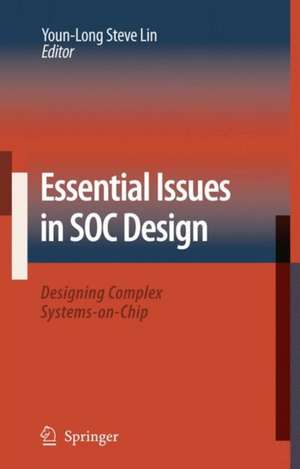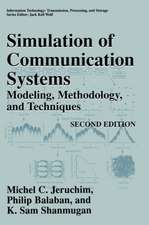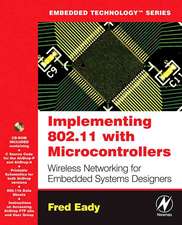Essential Issues in SOC Design: Designing Complex Systems-on-Chip
Editat de Youn-Long Steve Linen Limba Engleză Hardback – noi 2006
SOC design is fast becoming the key area of focus that engineers and researchers from the Electronic Design Automation field are focusing on in their quest to further develop Integrated Circuit technology. The more systems and even networks that we can integrate on one piece of silicon, the faster, cheaper, more powerful and efficient the technology will become.
Essential Issues in SOC Design contains valuable academic and industrial examples for those involved with the design of complex SOCs, all contributors are selected from a region of the world that is generally known to lead the "SOC-Revolution", namely Asia.
| Toate formatele și edițiile | Preț | Express |
|---|---|---|
| Paperback (1) | 646.11 lei 6-8 săpt. | |
| SPRINGER NETHERLANDS – 19 oct 2010 | 646.11 lei 6-8 săpt. | |
| Hardback (1) | 652.49 lei 6-8 săpt. | |
| SPRINGER NETHERLANDS – noi 2006 | 652.49 lei 6-8 săpt. |
Preț: 652.49 lei
Preț vechi: 767.63 lei
-15% Nou
Puncte Express: 979
Preț estimativ în valută:
124.88€ • 130.03$ • 105.53£
124.88€ • 130.03$ • 105.53£
Carte tipărită la comandă
Livrare economică 10-24 martie
Preluare comenzi: 021 569.72.76
Specificații
ISBN-13: 9781402053511
ISBN-10: 1402053517
Pagini: 412
Ilustrații: VII, 403 p.
Dimensiuni: 155 x 235 x 28 mm
Greutate: 0.75 kg
Ediția:2006
Editura: SPRINGER NETHERLANDS
Colecția Springer
Locul publicării:Dordrecht, Netherlands
ISBN-10: 1402053517
Pagini: 412
Ilustrații: VII, 403 p.
Dimensiuni: 155 x 235 x 28 mm
Greutate: 0.75 kg
Ediția:2006
Editura: SPRINGER NETHERLANDS
Colecția Springer
Locul publicării:Dordrecht, Netherlands
Public țintă
ResearchCuprins
1: Essential Issues in System-on-a-Chip Design; Youn-Long Lin. 2: An SOC Controller for Digital Still Camera; Jiing-Yuang Lin, Chien-Liang Chen and Youn-Long Lin. 3: Multimedia IP Development – Image and Video Codecs; Liang-Gee Chen, Chung-Jr Lian, Ching-Yeh Chen, and Tung-Chien Chen. 4: SOC Memory System Design; Kun-Bin Lee and Tian-Sheuan Chang. 5: Embedded Software; Tai-Yi Huang, Shiao-Li Tsao, Le-Chun Wu, Edward T.-H Chu, and Ko-Yun Liu. 6: Energy Management Techniques for SoC Design; Hiroto Yasuura, Tohru Ishihara, Masanori Muroyama. 7: SOC Prototyping and Verification; Moo-Kyoung Chung, Young-Il Kim, Jae-Gon Lee, Wooseung Yang, Ando Ki, and Chong-Min Kyung. 8: SOC Testing and Design for Testability; Cheng-Wen Wu and Chih-Tsun Huang. 9: Physical Design for System-On-a-Chip; Yao-Wen Chang, Tung-Chieh Chen, and Huang-Yu Chen.
Recenzii
From the review by Dr. Grant Martin, Springer author and Chief Scientist at Tensilica Inc., Santa Clara, USA:
I have looked over the proposal. I think it is basically sound and Prof. Lin has assembled a good group of participants. All the chapters appear sound in scope and author backgrounds. In particular, the case study on the digital still camera controller sounds quite interesting and a good adjunct chapter in the book.
On another point - this seems like a good book to have translated into Chinese from the word go - (rather than first publish in English and then translate). Is a Chinese translation planned? Clearly if so it could become a standard text in Greater China area.
I have looked over the proposal. I think it is basically sound and Prof. Lin has assembled a good group of participants. All the chapters appear sound in scope and author backgrounds. In particular, the case study on the digital still camera controller sounds quite interesting and a good adjunct chapter in the book.
On another point - this seems like a good book to have translated into Chinese from the word go - (rather than first publish in English and then translate). Is a Chinese translation planned? Clearly if so it could become a standard text in Greater China area.
Notă biografică
Youn-Long Lin was born in Yun-Lin, Taiwan, in 1957. He received his B.S. degree in electronics engineering from National Taiwan University of Science and Technology (formerly, National Taiwan Institute of Technology), Taipei, Taiwan, in 1982, and his Ph.D. in computer science from the University of Illinois, Urbana-Champaign, IL, U.S.A. in 1987. Upon his graduation, he joined National Tsing Hua University, Hsin-Chu, Taiwan, where he estabilshed the THEDA Group (Tsing Hua EDA), served as Director of the University Computer and Communication Center, Chairman of the Department of Computer Science, Secretariat General of the University and Director of the University Library. Dr Lin is now a professor of computer science. He is also an adjunct professor of Peking University, Beijing. He is elected the president of Taiwan Integrated Circuit Design Society (TICD) for 2005-06.
Between 1977-1979, Dr Lin was in military service with Chung Cheng Armed Forces Preparatory School as a Second Lieutenant. In 1979-1980, he was with Taiwan Cement Corp. as a field instrument engineer. In 1981-1983, he was with the Atomic Power Division of Taiwan Power Corp. as a mini-computer system administrator and database AP developer. In 1984-1987, he was a research assistant with the Department of Computer Science, University of Illinois, Urbana-Champaign, IL, USA. In 1998-1999, on sabbatical leave from Tsing Hua, he co-founded Global UniChip Corp., a fabless ASIC/IP/SOC vendor, serving as its Chief Technical Advisor. Between 2001 and 2003, he took a leave-of-absence from Tsing Hua working for UniChip as its Executive Vice President.
Professor Lin's primary research interest is in computer-aided design (CAD) of very large-scale integrated circuits (VLSI) with emphasis on physical design automation and high-level synthesis. He co-authored the book "High Level Synthesis -- Introduction to Chip and System Design." He also spend great effort in promoting the VLSI design and CAD education in Taiwan. His current research focus is on design technology for System-on-a-Chips (SOC) employing reusable silicon intellectual properties (IPs).
He has served on program committee, organizing committee, steering committee, and executive committee for several conferences and workshops on various aspects of CAD including the Design Automation Conference(DAC), the International Conference on CAD(ICCAD), the Asia South-Pacific Conference on Design Automation(ASPDAC), the Asia Pacific Conference on Hardware Description Languages(APCHDL), the workshop on Synthesis And System Integration of MIxed technology(SASIMI), the International Symposium on System Synthesis(ISSS), the International Symposium on Physical Design (ISPD), the ACM Embedded Software Conference (EMSOFT), and the VLSI/CAD Symposium of Taiwan. Professor Lin has also served on the editorial boards of the ACM Transactions on Design Automation of Electronic Systems (TODAES) , the ACM Transactions on Embedded Computing Systems (TECS) , Journal of the Chinese Engineering Society, and the Journal of Information Science and Engineering (JISE) .
Dr. Lin has been a consultant to the Institute for Information Industry (III), the Industrial Technology Research Institute (ITRI), the Electronic Research and Service Organization (ERSO), and the Computer and Communication research Laboratory (CCL). He is an advisor of the Science and Technology Advisory Office, Ministry of Education, R.O.C., in charge of VLSI design education program, and a co-PI of the Chip and System Implementation Center (CIC) program of the National Science Council (NSC), R.O.C. He also served on Intel's Asia-Pacific Advisory Board and advisory boards of several EDA and consumer electronics startups.
Professor Lin received a national fellowship for studying abroad from the Ministry of Education, R.O.C. in 1983, co-received the Outstanding Young Author Award from the IEEE Circuit and System Society in 1990, the Outstanding Design Award from the ASP-DAC University LSI Design Contest in 2000, and received the Highest-Honored Research Award from the NSC three consecutive times in 1992, 1994, and 1996. He has been an NSC research fellow since 1998.
Dr. Lin is a senior member of the IEEE, the IEEE Computer Society, the IEEE Circuit and System Society, the IEEE Solid State Circuit Society, and the Association for Computing Machinery. He is a board member of the Taiwan IC Design Society. He is a nation-certified electrical engineer.
Between 1977-1979, Dr Lin was in military service with Chung Cheng Armed Forces Preparatory School as a Second Lieutenant. In 1979-1980, he was with Taiwan Cement Corp. as a field instrument engineer. In 1981-1983, he was with the Atomic Power Division of Taiwan Power Corp. as a mini-computer system administrator and database AP developer. In 1984-1987, he was a research assistant with the Department of Computer Science, University of Illinois, Urbana-Champaign, IL, USA. In 1998-1999, on sabbatical leave from Tsing Hua, he co-founded Global UniChip Corp., a fabless ASIC/IP/SOC vendor, serving as its Chief Technical Advisor. Between 2001 and 2003, he took a leave-of-absence from Tsing Hua working for UniChip as its Executive Vice President.
Professor Lin's primary research interest is in computer-aided design (CAD) of very large-scale integrated circuits (VLSI) with emphasis on physical design automation and high-level synthesis. He co-authored the book "High Level Synthesis -- Introduction to Chip and System Design." He also spend great effort in promoting the VLSI design and CAD education in Taiwan. His current research focus is on design technology for System-on-a-Chips (SOC) employing reusable silicon intellectual properties (IPs).
He has served on program committee, organizing committee, steering committee, and executive committee for several conferences and workshops on various aspects of CAD including the Design Automation Conference(DAC), the International Conference on CAD(ICCAD), the Asia South-Pacific Conference on Design Automation(ASPDAC), the Asia Pacific Conference on Hardware Description Languages(APCHDL), the workshop on Synthesis And System Integration of MIxed technology(SASIMI), the International Symposium on System Synthesis(ISSS), the International Symposium on Physical Design (ISPD), the ACM Embedded Software Conference (EMSOFT), and the VLSI/CAD Symposium of Taiwan. Professor Lin has also served on the editorial boards of the ACM Transactions on Design Automation of Electronic Systems (TODAES) , the ACM Transactions on Embedded Computing Systems (TECS) , Journal of the Chinese Engineering Society, and the Journal of Information Science and Engineering (JISE) .
Dr. Lin has been a consultant to the Institute for Information Industry (III), the Industrial Technology Research Institute (ITRI), the Electronic Research and Service Organization (ERSO), and the Computer and Communication research Laboratory (CCL). He is an advisor of the Science and Technology Advisory Office, Ministry of Education, R.O.C., in charge of VLSI design education program, and a co-PI of the Chip and System Implementation Center (CIC) program of the National Science Council (NSC), R.O.C. He also served on Intel's Asia-Pacific Advisory Board and advisory boards of several EDA and consumer electronics startups.
Professor Lin received a national fellowship for studying abroad from the Ministry of Education, R.O.C. in 1983, co-received the Outstanding Young Author Award from the IEEE Circuit and System Society in 1990, the Outstanding Design Award from the ASP-DAC University LSI Design Contest in 2000, and received the Highest-Honored Research Award from the NSC three consecutive times in 1992, 1994, and 1996. He has been an NSC research fellow since 1998.
Dr. Lin is a senior member of the IEEE, the IEEE Computer Society, the IEEE Circuit and System Society, the IEEE Solid State Circuit Society, and the Association for Computing Machinery. He is a board member of the Taiwan IC Design Society. He is a nation-certified electrical engineer.
Caracteristici
State-of-the-art in issues related to SOC design by leading experts in the fields Covers IP development, verification, integration, chip implementation, testing and software











